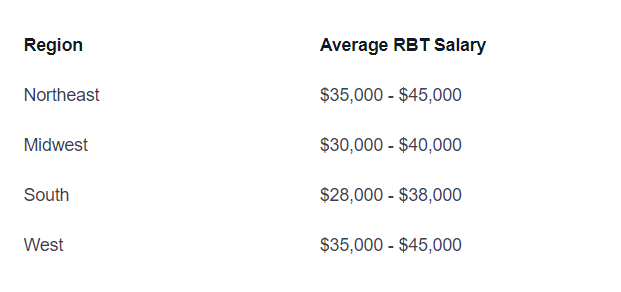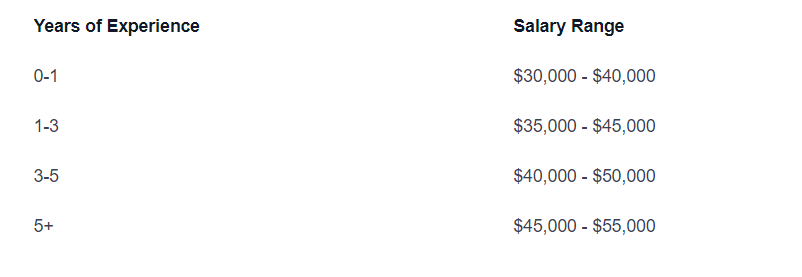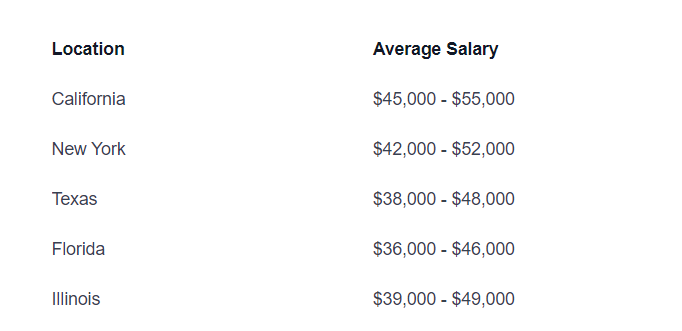Average Registered Behavior Technician (RBT) Salary
Discover the average Registered Behavior Technician (RBT) salary! Explore factors, benefits, and tips for maximizing your earnings.

Registered Behavior Technician (RBT) Overview
To understand the average salary of a Registered Behavior Technician (RBT), it's important to first grasp the role and responsibilities associated with this position.
%2520Salary-80.jpeg)
What is a Registered Behavior Technician (RBT)?
A Registered Behavior Technician (RBT) is a professional who works in the field of applied behavior analysis (ABA). They provide direct therapy to individuals with autism spectrum disorder (ASD) and other developmental disabilities under the supervision of a Board Certified Behavior Analyst (BCBA). RBTs play a crucial role in implementing behavior intervention plans and teaching new skills to individuals in need.
RBTs are responsible for working directly with clients, implementing behavior reduction strategies, and teaching appropriate replacement behaviors. They collect data on client progress, assist with assessments, and collaborate with the BCBA to create effective treatment plans. RBTs also provide support to clients' families, ensuring consistency and generalization of skills across various environments.
Roles and Responsibilities of an RBT
The roles and responsibilities of an RBT can vary depending on the setting and population they work with. However, some common responsibilities include:
- Implementing behavior intervention plans developed by the BCBA
- Collecting accurate and reliable data on client behavior
- Assisting with functional assessments and skill assessments
- Providing direct one-on-one therapy to clients
- Teaching and reinforcing appropriate behaviors
- Assisting with generalization and maintenance of skills
- Collaborating with the BCBA and other team members to ensure effective treatment
- Maintaining professional and ethical standards in all interactions
RBTs play a vital role in the field of ABA, contributing to the well-being and progress of individuals with developmental disabilities. Their dedication and skillset make them an integral part of the therapy team, providing valuable support and guidance to clients and their families.
Factors Affecting RBT Salary
Several factors come into play when determining the salary of a Registered Behavior Technician (RBT). Understanding these factors can provide insight into the variations in RBT salaries across different individuals and locations.
Experience and Skill Level
One of the primary factors influencing an RBT's salary is their experience and skill level. As RBTs gain more experience and develop their skills, they often become more valuable to employers. With increased expertise, RBTs may have the opportunity to take on more complex cases or supervisory roles, which can lead to higher salaries.
Geographic Location
Geographic location is another significant factor that affects RBT salaries. The cost of living and demand for RBT services can vary greatly from one location to another. In areas with a higher cost of living or a greater demand for RBTs, salaries tend to be higher. Conversely, in areas with a lower cost of living or a lower demand for RBTs, salaries may be lower.
To provide a better understanding of the salary differences across locations, the following table illustrates the average RBT salaries in different regions:

Please note that these salary ranges are approximate and can vary based on specific factors within each region, such as state regulations and local market conditions.
Employment Setting
The employment setting in which an RBT works can also impact their salary. RBTs can be employed in various settings, including private practices, clinics, schools, and residential facilities. The salary offered may differ based on the type of employer and the resources available.
In some cases, RBTs employed by larger organizations or institutions may receive higher salaries due to the availability of additional benefits and resources. On the other hand, RBTs working in smaller practices or non-profit organizations may have lower salaries but may find fulfillment in other aspects of their work.
It's important to consider that factors such as experience, geographic location, and employment setting interact with each other and contribute to the overall salary structure for RBTs. By understanding these factors, RBTs can make informed decisions regarding their career progression, geographic location preferences, and employment choices.
Average RBT Salary
When considering a career as a Registered Behavior Technician (RBT), understanding the average salary can provide valuable insights into the earning potential of this profession. In this section, we will explore the national average RBT salary, the salary range based on years of experience, and how salaries can vary by location.
National Average RBT Salary
The national average RBT salary provides a benchmark for understanding the average income earned by RBTs across the country. It's important to note that salaries can vary based on factors such as experience, geographic location, and employment setting.
According to recent data, the national average salary for RBTs is around $40,000 per year. It's worth mentioning that this figure may fluctuate based on various factors, such as the demand for RBTs in different regions and the cost of living.
Salary Range by Years of Experience
The salary of an RBT can also vary based on the number of years of experience in the field. As RBTs gain more experience and expertise, they may see an increase in their earning potential.
Here is a breakdown of the salary range for RBTs based on years of experience:

It's important to note that these figures are approximate and can vary depending on factors such as location and the specific employer.
Salary Comparison by Location
The location in which an RBT practices can have a significant impact on their salary. The cost of living, demand for RBTs, and regional economic factors can all influence salary ranges.
Here is a comparison of average RBT salaries in different locations:

These figures are approximate and can fluctuate based on factors such as the specific city within each state and the demand for RBTs in those areas.
Understanding the average RBT salary, the salary range based on years of experience, and the salary differences by location can help individuals make informed decisions about their career path as an RBT. It's important to remember that salaries are influenced by multiple factors and can vary from one individual to another.
Job Benefits and Advancement Opportunities
Registered Behavior Technicians (RBTs) not only enjoy a rewarding career in the field of applied behavior analysis but also receive various job benefits and have opportunities for professional growth and advancement.
Benefits of Being an RBT
Being an RBT comes with several benefits that make it an attractive career choice for many individuals. These benefits may include:
- Meaningful Work: RBTs have the opportunity to make a positive impact on the lives of individuals with autism and other developmental disabilities. By implementing behavior intervention plans, they help individuals learn new skills and improve their overall quality of life.
- Career Stability: The demand for RBTs continues to grow as the need for applied behavior analysis services increases. This provides RBTs with job security and stability in the field.
- Flexible Work Environment: RBTs often have the flexibility to work in a variety of settings, including homes, schools, clinics, and community-based programs. This flexibility allows for a diverse range of experiences and the opportunity to work with diverse populations.
- Professional Development: As part of their ongoing professional development, RBTs receive supervision from Board Certified Behavior Analysts (BCBAs) or Board Certified Assistant Behavior Analysts (BCaBAs). This supervision helps RBTs enhance their knowledge and skills in behavior analysis.
- Collaborative Teamwork: RBTs work collaboratively with a team of professionals, including BCBAs, BCaBAs, and other professionals in the field of applied behavior analysis. This collaborative approach allows for continuous learning and professional growth.
Advancement Opportunities for RBTs
While RBTs play a crucial role in the field of applied behavior analysis, there are also opportunities for advancement and career growth. Advancement opportunities for RBTs may include:
- Board Certification: RBTs can pursue further education and training to become a Board Certified Behavior Analyst (BCBA) or a Board Certified Assistant Behavior Analyst (BCaBA). These advanced certifications allow RBTs to take on more responsibilities and provide behavior analysis services independently.
- Supervisory Roles: With experience and further education, RBTs can progress to supervisory roles where they oversee and provide guidance to other RBTs or behavior technicians.
- Specializing in a Specific Population: RBTs can choose to specialize in working with specific populations, such as individuals with autism, developmental disabilities, or mental health disorders. Specializing allows RBTs to develop expertise in a particular area and work with a specific population they are passionate about.
- Higher Education: RBTs may choose to pursue higher education, such as a master's or doctoral degree in applied behavior analysis or a related field. Higher education can open doors to more advanced positions and leadership roles in the field.
By taking advantage of these advancement opportunities, RBTs can further their career, increase their earning potential, and broaden their impact in the field of applied behavior analysis.
As RBTs continue to gain experience and expertise, they can enjoy the benefits of their profession while pursuing growth and advancement in their careers.
Tips for Maximizing RBT Salary
As a Registered Behavior Technician (RBT), there are several strategies you can employ to maximize your salary and advance in your career. Here are some key tips to consider:
Continuing Education and Training
Continuing education and training are essential for staying up-to-date with the latest developments in the field of applied behavior analysis (ABA). By pursuing additional certifications, workshops, and courses, you can enhance your knowledge and skills, making you a more valuable asset to employers. This increased expertise can lead to higher-paying job opportunities.
Continuing Education Opportunities
Master's degree in ABA
Advanced ABA certifications
Specialized workshops and conferences
Seeking Supervision and Mentorship
Seeking supervision and mentorship from experienced professionals in the field can significantly impact your career growth and salary potential. By working closely with a supervisor or mentor, you can receive valuable guidance, feedback, and support. This guidance can help you develop your skills and increase your effectiveness as an RBT, potentially leading to salary advancements and promotions.
Benefits of Seeking Supervision and Mentorship
Personalized guidance and feedback
Skill development and refinement
Networking opportunities
Negotiating Salary and Compensation
When considering a new job offer or seeking a salary increase in your current position, it's important to be prepared to negotiate. Research the average salary range for RBTs in your specific geographic area and take into account your level of experience and qualifications. Highlight your accomplishments and the value you bring to the organization. By presenting a strong case and advocating for yourself, you may be able to secure a higher salary or additional compensation benefits.
When negotiating, consider factors beyond just the base salary, such as health insurance, retirement plans, and paid time off. These additional benefits can significantly impact your overall compensation package.
Tips for Salary Negotiation
Research the average salary range for RBTs in your area
Highlight your accomplishments and qualifications
Consider the entire compensation package, including benefits
By focusing on continuing education, seeking supervision and mentorship, and effectively negotiating your salary and compensation, you can work towards maximizing your earning potential as an RBT. Remember to stay proactive in your professional development and continuously seek opportunities for growth and advancement in the field of applied behavior analysis.
Sources
https://www.crossrivertherapy.com/rbt/average-salaries
https://www.discoveryaba.com/aba-therapy/average-rbt-salary
Similar articles
We’re here to help you

Our team is here to assist you in this process. Contact us for any assistance.
it’s easy to apply
We Accept Most Insurances
Our in-network insurance partnerships make ABA therapy more accessible to families throughout our service areas.







Our Insurance Process
We'll request your insurance details to help us verify your plan's coverage for ABA therapy. Once we've received this information, we'll walk you through your benefits, including copayments, deductibles and out-of-pocket maximums, so you know what to expect in advance.
Our team will then handle the preauthorization and all the necessary paperwork.
.svg)





















.jpeg)


































.jpeg)




.jpeg)







.jpeg)











.jpeg)
















